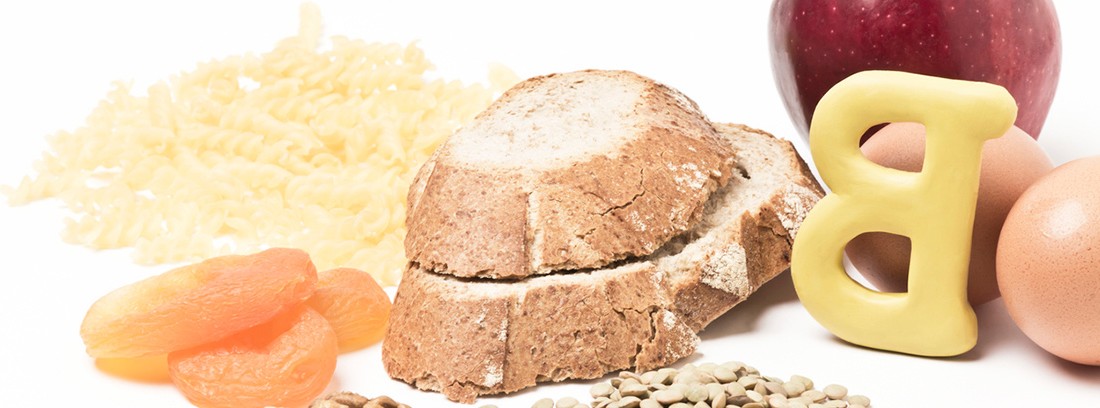Vitamin B deficiency and excess

Each has its own characteristics and is found in different types of food, each favoring different processes.
B1 (thiamine)
It is a vitamin that helps cells to convert carbohydrates into energy. It is also necessary for the proper functioning of the heart, muscles, and nervous system. The foods that contain it are: beer yeast, eggs, nuts, legumes, pork and beef, wheat germ, milk, soy, fish and garlic. La is rich in thiamine. Cooking food and husking cereals destroys it.
- Thiamine deficiency: can cause weakness, fatigue and neurological disorders (irritability or depression). The most serious manifestation would be a disease called beriberi (in adults).
- Excess vitamin thiamine: There is no known toxicity from excess thiamine.
B2 (riboflavin)
It is a vitamin that participates in body growth and in production of red blood cells. It also helps the development of the embryo. Light destroys this vitamin, so foods containing it should not be stored in glass containers. It is mainly found in meats, eggs, mushrooms, fatty cheeses, fish, legumes and cereals.
- Vitamin B2 deficiency: its deficiency is manifested as lesions on the skin (dermatitis), mucous membranes (mouth ulcers and glossitis) and ocular itching, tearing and blurred vision. It can also cause anemia. Strict vegetarians or the existence of intestinal absorption problems tend to have a deficiency of this vitamin.
- Excess of B2: Riboflavin toxicity is not known.
B3 (niacin)
It is a vitamin that intervenes in the functioning of the digestive system, skin and nervous system. It is also important for the conversion of food into energy. Deficiency states are rare since our body is capable of producing it by itself from an amino acid called tryptophan.
The foods that contain it are:, bran, nuts, veal liver, wheat germ, peach dried apricots, brown rice, mushrooms, poultry and fish.
- Vitamin b3 deficiency: the severe deficit is called pellagra and it occurs in a state of severe malnutrition causing: dermatitis, diarrhea and dementia. High doses of niacin can cause: liver damage, peptic ulcer and skin rash.
B5 (pantothenic acid) and biotin (B8)
They are vitamins of group B essential for proper growth and they help the body break down and use food. They help in the metabolism of proteins, carbohydrates and fats.
It is found in a large number and variety of foods (pantothen in Greek means "everywhere"). The foods richest in pantothenic acid are organ meats, brewer's yeast, egg yolks, fish, dairy products, legumes, potatoes, meat, and whole grains.
- B5 or B8 deficiency: biotin deficiency is common in children fed intravenous nutrition without supplementation of this vitamin or children with the short bowel syndrome with chronic diarrhea. The symptoms of biotin deficiency are: dermatitis, alopecia, drowsiness, yeast infections and hypotonia.
- Excess of vitamin B5 and B8: its excess can cause diarrhea.
B6 (pyridoxine)
It is a water-soluble vitamin that dissolves in water and cannot be stored by the body. This requires a daily supply of this vitamin.
Pyridoxine helps the immune system to produce antibodies (defenses) needed to fight infection. It is also very important for maintaining normal neurological function and forming red blood cells. It is essential for protein metabolism. It is found in the following foods: oily fish, nuts, legumes, chicken meat, banana, eggs, and whole grains.
- B6 deficiency: deficiency of this vitamin produces mouth and tongue ulcers, irritability, confusion, and depression.
- Excess of B6: excess vitamin B6 can cause neurological disorders and numbness of the joints.
B9 or folic acid
It is a B group vitamin that works together with Vitamin C and B12 to help the body use and create proteins. It is also a very important vitamin for the formation of red blood cells and DNA. It is key in the growth of tissues and, helps prevent certain malformations of the nervous system such as spina bifida. It is found in nuts, fruits, green leafy vegetables, cereals and organ meats.
- Folic acid deficiency: folic acid deficiency can cause growth retardation, glossitis (inflammation of the tongue), mouth ulcers, peptic ulcers, and diarrhea. It can also cause some type of anemia.
- Excess folic acid: excessive consumption does not cause any harm.
B12 (cobalamin)
It is a vitamin found in eggs, meat, seafood, and dairy. It is essential for the red blood cell formation, for the growth and regeneration of body tissues. Strict vegetarian diets can contribute to its deficiency.
His absorption mechanism is complicated and it requires a protein secreted by the stomach called intrinsic factor. The inherited deficiency of this protein can cause a deficiency of cobalamin. Other intestinal absorption problems can decrease cobalamin levels such as celiac disease, intestinal parasites or metabolic disorders. It accumulates in the liver so you have to spend very long periods without its contribution in the diet for a deficit to occur.
Vitamin B12 deficiency: cobalamin deficiency leads to the so-called "pernicious anemia": red blood cells decrease and in children it is a hereditary disease since they are born without intrinsic factor and the intestine cannot absorb Vitamin B12. The low levels of Vitamin B12 They can also cause: numbness and tingling of the arms and legs, weakness, diarrhea, tiredness, paleness, shortness of breath and loss of balance.
Remember to take care of your family with him in order to be protected before any pathology and disease appear. Go to any of our medical centers and consult with our specialist doctors!
CALCULATE YOUR PRICE
Dra. Esther Martínez García Pediatric Specialist
(Updated at Apr 13 / 2024)